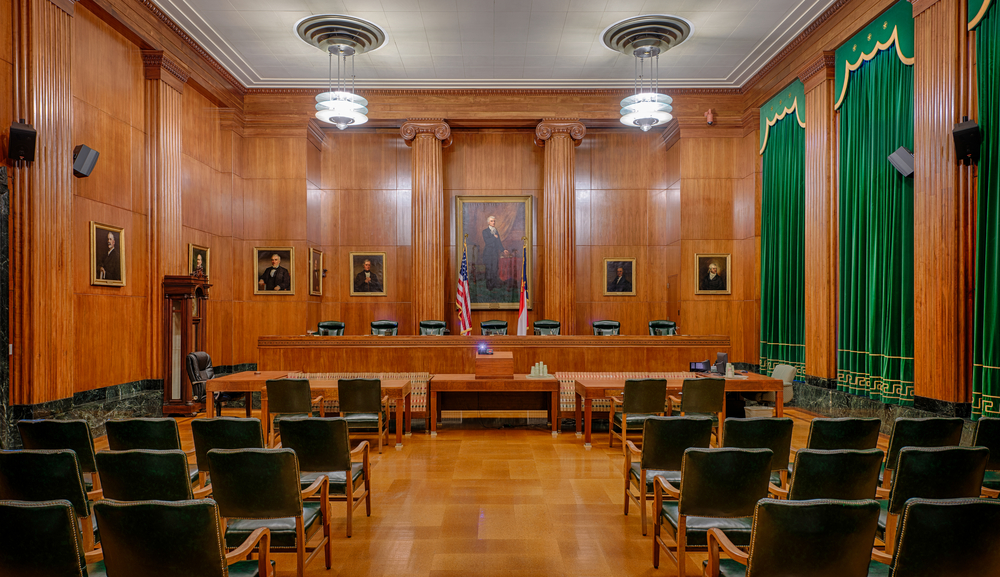Conservative Majority on North Carolina Supreme Court Exerts Power to Impose Agenda
Issues

Last month, the conservative-controlled North Carolina Judicial Standards Commission rightfully dismissed and closed its ethics investigation against Justice Anita Earls, a Democratic member of the state’s Supreme Court. Despite the commission dropping its investigation, the way she was targeted falls into a broader pattern of politization in the North Carolina judiciary that creates a dangerous partisan environment against justices who do not fall in line with their agenda.
The investigation, originally launched by the commission in August, focused on comments Justice Earls — the court’s only Black woman — made in an interview with Law360 about the lack of racial diversity in the state’s judiciary and implicit biases she perceived in her colleagues. After a complaint was filed because of her comments, the Judicial Standards Commission opened an investigation against her, and Justice Earls countered by filing a federal lawsuit against the commission for violating her free speech rights. Justice Earls’ multiple requests for an injunction were denied, however, by federal district court Judge William Osteen Jr., a George W. Bush appointee. Once the investigation was closed, Justice Earls withdrew her suit, and moving forward, she has stated that she will have the commission pre-screen her public statements.
The commission and the judiciary both have been taken over by conservative interests, as People’s Parity Project’s Billy Corriher wrote in Slate. As soon as he took office in 2021, Chief Justice Paul Newby replaced the Judicial Standards Commission director with a more reliable and lenient conservative ally, marking a new era for judicial ethics in the state. Then in 2023, the state legislature — led by Senate President Phil Berger Sr. (the father of current conservative Supreme Court Justice Phil Berger Jr.) — made significant changes to the judiciary within the proposed budget to help cement its power. These changes included eliminating automatic appeals of split decisions from the court of appeals to the Supreme Court, the creation of special judgeships to hear constitutional challenges to state laws or issues like gerrymandering of political maps, and sweeping changes to the composition of the Judicial Standards Commission that would give legislators and the chief justice sole appointing power of its members.
In the first days of 2024, Newby’s partisan takeover of North Carolina’s courts deepened with the stealth removal of the chief judge on the Court of Appeals. Judge Donna Stroud, a Republican judge, has served on the court of appeals since 2006, having been twice re-elected to her position on the bench and serving as chief judge on the court since 2021. However, as of January 1, Stroud was swiftly removed from her leadership position and replaced with now-Chief Judge Dillon, also a Republican, who was first elected to the court of appeals in 2012. Notably, Dillon most recently served as chair of the Judicial Standards Commission, the same commission that launched the bogus ethics investigation against Justice Earls.
In North Carolina, it has been tradition for the longest serving member of that court to serve as chief judge, a tradition that Newby publicly lamented when Gov. Cooper appointed Cheri Beasley as chief justice over him in 2019. Because of this, Stroud believes her sudden removal is due to a larger political attack against her. She was politically targeted during her 2022 re-election campaign by Justice Berger in comments on social media disparaging Stroud and endorsing her primary challenger. Stroud believes Berger retaliated against her for not supporting his former law clerk as clerk of court over a Democratically affiliated clerk. Notably, the state Code of Judicial Conduct forbids sitting judges from endorsing candidates without being candidates themselves, but Berger circumvented this by conspicuously declaring his candidacy six years before the end of his next term.
These are just a handful of the latest examples of Newby and conservative legislators and justices consolidating their power and creating a hostile environment for not only judges who do not fall in line with their conservative vision but also the rule of law in the state.
As a result, the rights and livelihood of North Carolinians are suffering. Last year, the new conservative-controlled Supreme Court made unprecedented moves to rehear cases they had just decided in 2022 under a liberal majority. This allowed the new conservative court to greenlight partisan gerrymandered maps and a discriminatory voter ID law after having ruled against them just months prior — despite nothing changing in the laws at all. Notably, the state’s code also forbids judges from ruling on cases involving relatives. Justice Berger did not recuse himself from either of these cases despite his father, the Senate President Pro Tempore, being named a defendant for his role in creating the maps.
It’s likely that the court’s behavior will continue to implicate the rights of the people of North Carolina. Looking to later this year, the court will rehear cases affecting the court’s 2022 Leandro decision mandating the state comply with its constitutional duty to ensure a sound, basic public education for every child. Voting rights and democracy have already been severely undercut, public education appears to be next on the chopping block, and if this power play continues, more constitutional rights will likely follow.
Rachel Bracken is a senior regional state courts manager at Alliance for Justice.
